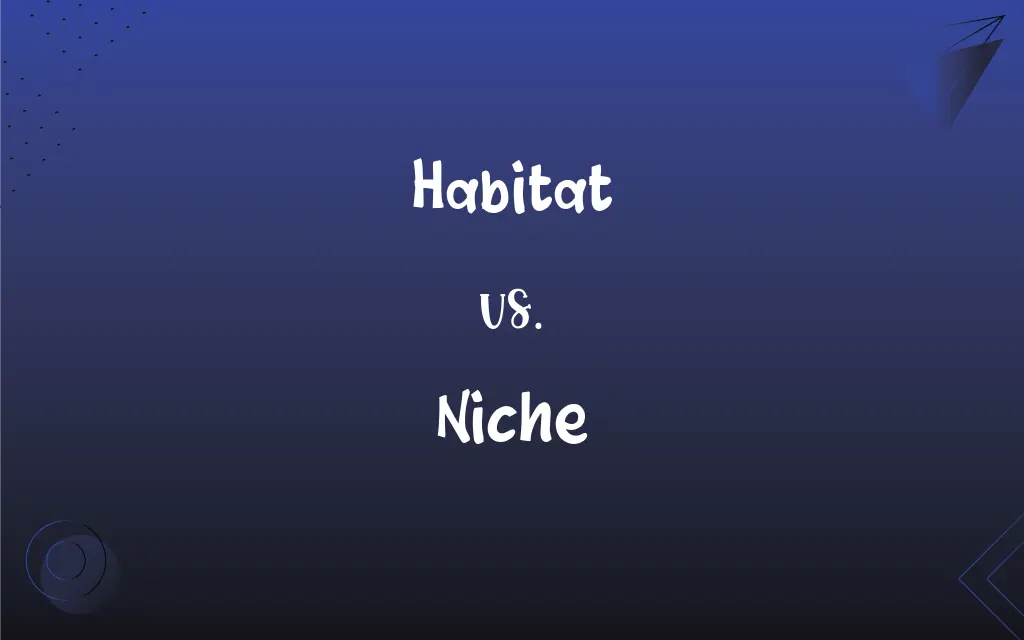Habitat vs. Niche: What's the Difference?
Edited by Janet White || By Harlon Moss || Updated on October 18, 2023
Habitat is where an organism lives; niche is its role within that environment.

Key Differences
Habitat refers to the physical environment or location in which an organism resides. It is the place where a particular species can be found. Niche, on the other hand, defines the specific role or function of an organism within its habitat. It encompasses its interactions with biotic and abiotic factors.
Habitat can be understood as the address of an organism, indicating its geographical location. It includes elements like soil, water, and climate. Niche is like the profession of an organism, detailing its interactions, behaviors, and position within the food chain in its habitat.
Habitat can be broad, such as a forest or desert, accommodating many species. Within these habitats, each species has its own niche, which is the specific way it utilizes resources, competes, and coexists with other species. The niche ensures that different species in the same habitat don't directly compete for the same resources.
Habitats are often visible and tangible, such as a pond or a meadow. Niche is more of a conceptual understanding, addressing how an organism fits into the ecological dynamics of its habitat. The same species can potentially inhabit different habitats but will always have a specific niche in each.
While habitat focuses on 'where' an organism lives, niche delves deeper into 'how' it lives in that habitat, highlighting its unique interactions, behaviors, and relationships.
ADVERTISEMENT
Comparison Chart
Definition
The place where an organism lives.
The role an organism plays in its environment.
Focus
Location
Function
Example
Forest, desert, pond
Predator, decomposer, herbivore
Breadth
Broad, accommodating many species
Specific to each species within a habitat
Interaction
Deals with physical conditions
Deals with biotic and abiotic interactions
ADVERTISEMENT
Habitat and Niche Definitions
Habitat
The natural environment of an organism.
The dense forest was the bear's preferred habitat.
Niche
The specific role an organism has within an ecosystem.
The hummingbird found its niche as a pollinator in the ecosystem.
Habitat
The specific location or setting where an organism can be found.
The wetlands serve as a habitat for numerous bird species.
Niche
How an organism fits into its environment functionally.
The scavenger's niche is to clean up leftover organic matter.
Habitat
The geographical area occupied by a particular type of organism.
The desert is the primary habitat for camels.
Niche
An organism's position in the food web.
The apex predator sits at the top of its niche in the food chain.
Habitat
A place where a species commonly resides.
Coral reefs are the habitat for many marine species.
Niche
The range of conditions an organism can tolerate.
Certain deep-sea creatures have a niche in extreme pressure environments.
Habitat
A place where certain organisms thrive and reproduce.
The tropical rainforest is a diverse habitat with countless species.
Niche
The interactions and behaviors of an organism in its habitat.
Bees have a niche in pollinating flowers and making honey.
Habitat
The natural environment in which a species or group of species lives
Good coyote habitat.
Managing wildlife habitat.
Niche
A recess in a wall, as for holding a statue or urn.
Habitat
A particular kind of natural environment
Woodland and prairie habitats.
Niche
A cranny, hollow, or crevice, as in rock.
FAQs
How is a niche different from a habitat?
While habitat refers to 'where' an organism lives, niche describes 'how' it lives within that environment.
Can a habitat change over time?
Yes, habitats can evolve due to factors like climate change or human intervention.
Can multiple species share the same habitat?
Yes, many species can coexist in the same habitat.
Is the niche of an organism fixed?
No, niches can change based on environmental dynamics and interactions.
Is the food source part of an organism's niche?
Yes, the type of food an organism consumes is a component of its niche.
Can two species occupy the same niche in a habitat?
Two species occupying the same niche often compete, leading one to adapt, migrate, or face extinction.
What happens when an organism is removed from its habitat?
It can disrupt the ecological balance, affecting the roles and numbers of other organisms.
Can the same species have different habitats?
Yes, some species can thrive in diverse habitats depending on their adaptability.
How is niche partitioning significant in ecology?
It allows similar species to coexist by utilizing different resources or space within the same habitat.
Can human-made places be considered habitats?
Yes, areas like urban parks or farms can serve as habitats for certain species.
Do organisms adapt to fit their niche?
Yes, through evolution, organisms can adapt to better suit their niche.
What is a habitat?
Habitat is the place where an organism lives.
Why is the niche concept important in ecology?
It helps understand how organisms coexist and interact within habitats without direct competition.
How does climate affect a habitat?
Climate determines the temperature, rainfall, and other factors of a habitat, influencing its resident species.
Can an organism have multiple niches?
Typically, an organism has a primary niche, but under changing conditions, it might occupy secondary niches temporarily.
Do artificial environments like zoos replicate natural habitats?
Zoos attempt to mimic natural habitats, but they can't replicate all the complex interactions and freedom of wild habitats.
How do humans impact habitats?
Through activities like deforestation, urbanization, and pollution, humans can alter or destroy habitats.
How do predators fit into the concept of niche?
Predators have a specific niche, controlling prey populations and influencing the structure of communities.
How is a niche related to an organism's survival?
An organism's niche determines how it obtains food, reproduces, and interacts, directly impacting its survival.
How does habitat destruction impact biodiversity?
It can lead to species extinction, reduced populations, and loss of ecosystem services.
About Author
Written by
Harlon MossHarlon is a seasoned quality moderator and accomplished content writer for Difference Wiki. An alumnus of the prestigious University of California, he earned his degree in Computer Science. Leveraging his academic background, Harlon brings a meticulous and informed perspective to his work, ensuring content accuracy and excellence.
Edited by
Janet WhiteJanet White has been an esteemed writer and blogger for Difference Wiki. Holding a Master's degree in Science and Medical Journalism from the prestigious Boston University, she has consistently demonstrated her expertise and passion for her field. When she's not immersed in her work, Janet relishes her time exercising, delving into a good book, and cherishing moments with friends and family.































































